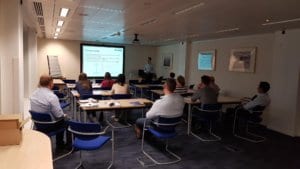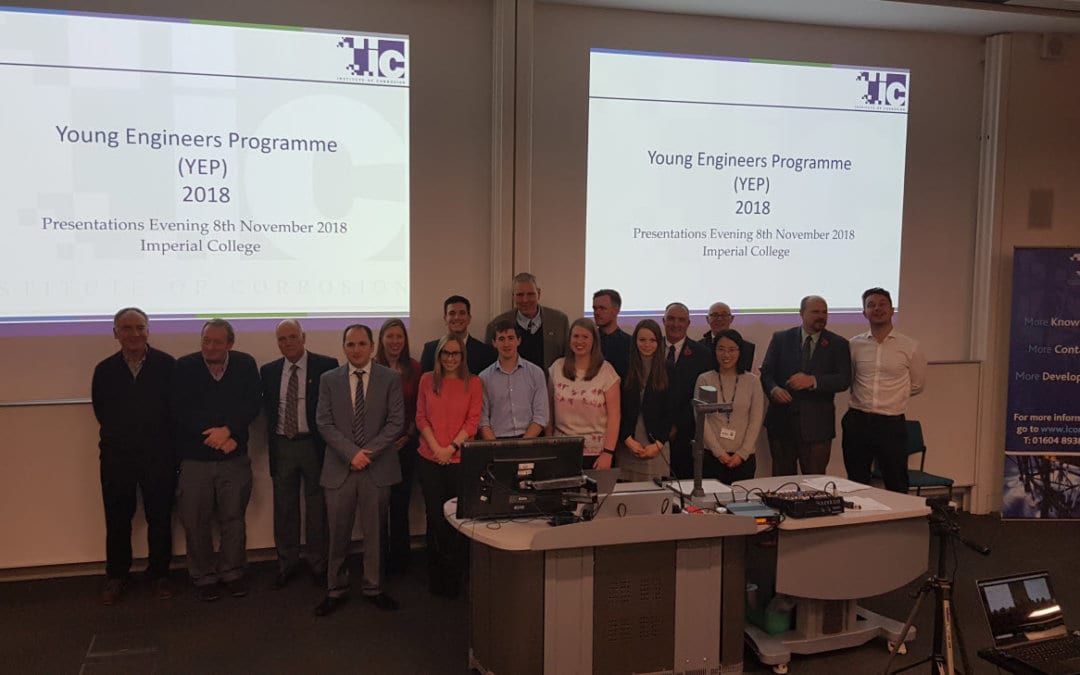What engineer training is best for young engineers?
Despite the UK government pushing engineering as a career choice in 2018 (the ‘Year of Engineering’), apprenticeship starts fell by 2.5% in engineering and manufacturing technologies between 2017/18 and 2018/19 (House of Commons Library Apprenticeship Statistics). That’s bad news in a sector that is suffering from a skills shortage, and in which it is estimated that 203,000 people with Level 3+ engineering skills will be required each year to 2024 to keep pace with demand.
To combat the skills shortage in UK engineering, it is incumbent on the industry to ensure that young engineers have access to the very best engineer training opportunities. Here at the Institute of Corrosion we are committed to professional development and training, with a particular focus on our early career members.
In this article, you’ll learn more about one of the most prestigious training initiatives for young engineers – the Young Engineer Programme (YEP).
Investing in the future

The Young Engineer Programme is pivotal in the development of young engineers.
What is the Young Engineer Programme?
Designed for the engineer who has been practicing in industry for a few years but wishes to develop their skills and knowledge more broadly, the Young Engineer Programme is an 11-month programme run every two years.
The 2018 programme reached its climax in November 2018, when teams presented to a judging panel, with the winning team crowned and given its reward – a trip to the NACE Corrosion Conference & Expo 2019.
How could the Young Engineer Programme benefit you?
The Young Engineer Programme provides a threefold process of learning:
- Delegates receive a series of lectures from industry experts in a range of subjects. This helps them broaden their own knowledge outside their own specific area of industry.
- Delegates then work in ‘project teams’ of four. The objective is to collaborate to discuss a real-world corrosion case study provided by an industry partner and come up with a practical engineering solution.
- The teams make a presentation of their findings to a panel of ICorr judges and the winning team gets to attend the NACE Corrosion Conference the following year.
In this way, delegates broaden their knowledge, improve their collaborative and project management skills, and develop their communication skills.
Other benefits of becoming a delegate on the Young Engineer Programme include expansion of your professional network and, of course, a major plus on your CV.
You receive mentoring throughout the Young Engineer Programme

As a delegate, you and your team will meet face-to-face with your mentor during the May to November period of the programme. You’ll also meet with your mentor on Skype, and the mentor can ask the author of the case study any questions that your team may have.
What do delegates say about engineer training during the Young Engineer Programme?
Word gets out when engineer training does what it says on the tin – and then some. Responses from 2018 delegates included:
“This programme has altered the way I think about my work and how I carry it out.”
“I hadn’t realised the value of ICorr and I will go back to work on Monday and encourage them to engage.”
A senior engineer in the ICorr fraternity said:
“This is probably the most important function in the UK Corrosion calendar, it’s truly fantastic.”
How do you join the Young Engineer Programme?
The Young Engineer Programme runs every two years. We open the programme to applicants in the September of the year before the programme starts and email our entire membership about the programme prior to this. We also send personal emails to the engineering community.
The programme has exploded in popularity. In 2018, there were 12 delegates in three teams of four who presented their findings on the case study. The current crop numbers eight teams of four. We expect programme applicant numbers to increase further next time round.
To ensure you learn of the next Young Engineer Programme at the earliest opportunity, we recommend that you become a member of the Institute of Corrosion. There are several grades of membership.
The Young Engineer Programme – a summary
As a ‘cradle to grave’ organisation, we support our members with engineer training throughout their career, from apprenticeship to Chartered Engineer status. Young ICorr (aimed at young professionals aged 35 and under) has an expanding membership base, supported by ICorr initiatives such as our free student membership.
The Young Engineer Programme is an invaluable addition to our training initiatives, helping you to expand your knowledge and network, improve your competencies and capabilities, and add prestigious training and development experience to your CV.
To learn more about the Young Engineer Programme, visit our YEP pages or email the Institute of Corrosion at admin@icorr.org.

